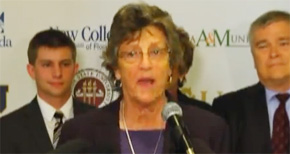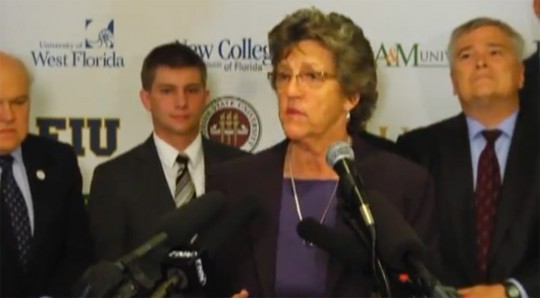Florida Universities Will Freeze Tuition For More State Money
December 6, 2012
University presidents pledged Wednesday not to increase tuition next year if the Legislature agrees to plow another $118 million into the State University System’s budget.
But leaders at the University of Florida and Florida State University would not pledge to stop pushing for legislation that would allow them to increase tuition by virtually unlimited amounts.
The “Aim Higher” initiative, unveiled at a press conference in the Capitol including most of the presidents and student body leaders of the state’s 12 universities, enters into a growing debate over how to fund higher education in Florida.
According to the university system, $118 million would equate to a tuition increase of 15 percent, the maximum the schools are allowed to ask for under the state’s differential tuition law.
Several universities had used that law in recent years to offset deep state cuts in higher education funding, though the consensus over the size of those tuition increases cracked last summer under pressure from Gov. Rick Scott.
 “With an investment provided for our students, we promise not to seek one penny of a tuition increase this year,” said University of West Florida President Judy Bense.
“With an investment provided for our students, we promise not to seek one penny of a tuition increase this year,” said University of West Florida President Judy Bense.
The new funding should be tied to performance measures, the university presidents said, lining up with the premium that some legislative leaders have placed on education accountability.
And Senate Appropriations Chairman Joe Negron, R-Stuart, told reporters Wednesday that he would like to shift additional funding from health care into education areas, potentially allowing the university system to compete with top-notch public schools like the University of North Carolina, the University of Virginia, the University of Texas, the University of Michigan, and the University of California, Berkeley.
“That’s not entirely a function of money, but it is significantly a function of money,” Negron said.
Scott issued a statement praising the universities for focusing on the concept of “value” in higher education, but notably did not specifically mention the universities’ request for additional funding.
“We are pleased to share this important goal with many of Florida’s finest higher education leaders who are committed to holding the line on tuition,” Scott said. “We look forward to working closely with them as we put together a proposed budget and other policies for the upcoming legislative session.”
But the leaders of FSU and Florida dismissed questions dealing with whether they would continue to seek “preeminent university” legislation, vetoed by Scott last year, allowing schools that meet certain standards to raise tuition by virtually unlimited amounts.
“It’s a different topic,” said FSU President Eric Barron. “We need to have preeminent universities. We need to have those metrics and support that allow universities to be preeminent.”
And Bernie Machen, president at the University of Florida, stressed the standards that were part of that bill as the key benefit.
“The tuition aspect of it was simply one mechanism that could be used to receive new resources,” Machen said. “This is part of that whole plan. You’ve got to take a much longer view of where we’re going with the university system than just focusing on one year’s tuition issue.”
By The News Service of Florida
Pictured top: University of West Florida President Judy Bense at a Capitol press conference Wednesday in Tallahassee. Image courtesy The News Service of Florida for NorthEscambia.com, click to enlarge.
Comments
9 Responses to “Florida Universities Will Freeze Tuition For More State Money”




ALSO CONSIDERING:
“Big oil is another. In all the debates in DC about cutting the budget I don’t hear these subsidies being talked about.”
They really need to do a better job of teaching vocabulary in school. But that isn’t the problem because it is already understood that “Subsidies do not have to be paid back and are a gift from the taxpayer.”
A subsidy is something given. I assumed those who talked about “oil company subsidies” were telling the truth so I checked and they weren’t, they were talking about deductions. I always wonder if they knew the truth or if they simply parroted the talking points others gave them.
http://www.nypost.com/p/news/opinion/opedcolumnists/the_prez_oil_tax_break_lies_Y2Yj6KCU9QIO0BKHs1Be7M
“- – - talk about huge “subsidies” — as if taxpayers are signing billion-dollar checks to oil and gas companies. But oil companies don’t get subsidies. Rather, like every other business, they’re allowed to take tax deductions for the expenses they incur.
“A tax deduction and a government subsidy aren’t the same. When politicians use the terms interchangeably, it misleads many Americans.”
David for information
not misinformation
REGARDING:
“Let’s not confuse subsidies with loans. GM has paid back the loan and we still build cars in this country by American based corporations. Subsidies do not have to be paid back and are a gift from the taxpayer.”
This is true. GM was loaned money at a low interest rate using public money and they repaid it back, for the most part. Had they not received the loan, the company would have gone into bankruptcy and been bought by some other company which would have likely made cars.
And if they had not made cars, that would mean Ford would have one less domestic competitor as it continued to make cars in America. This would probably have been good for Ford’s profits but we will never know.
And if Ford for some unexplained reason decided to stop making automobiles in the USA, we would still have domestic production, just not domestic ownership: Hyundai, Kia, Toyota, Honda made in USA but profits going elsewhere even though the paychecks would have gone to Americans.
David for proper public policies
Let’s not confuse subsidies with loans. GM has paid back the loan and we still build cars in this country by American based corporations. Subsidies do not have to be paid back and are a gift from the taxpayer.
If you are lucky enough to be born into a family that gives you a thousand acres of prime peanut/cotton land and all the resources to plant it, what is the purpose of the farm handouts? Shouldn’t commodity prices set the prices you get for your crop? These farmers want the welfare cut off for everyone but them.
Big oil is another. In all the debates in DC about cutting the budget I don’t hear these subsidies being talked about.
Even subsidies have their place. There are some industries that may not attract a huge outpouring of private investment, but because they serve a national interest it is better for the government to prop them up than to lose the industry and suffer the potential security or economic threat. I think farmers fit into this category a bit more neatly than, say, General Motors. I would put education up there, but primarily in the sciences.
I am not surprised that the push for 118 M and unlimited tuition raises is led by Bense. She was instrumental in foisting the Waterfront Park on the citizens of Pensacola for the tidy sum of 75 M (including interest) while at the same time receiving prestigious offices for herself at that location. All this, while the city faced 128+Million in unfunded pension liabilites that they can not pay and are loosing citizens and property tax dollars like water through a seive. Liberals just dont know when to quit do they ?
Really, it makes sense.
Let us say you have something you need $15 per item to make a living selling.
Let us say Gubment wants you to sell it for $10 per item.
If Gubment gives you $5 per item to do it, you can do so without going broke.
If it is worth paying, it is reasonable.
If it isn’t worth paying, it isn’t reasonable
It reminds me of how the USSR used to subsidize bread to the point that farmers could buy bread to feed their cattle cheaper than they could feed them wheat. Of course, in time the whole thing fell apart as such things are wont to do and nobody ever learns from history anyway.
David for subsidized engineering
and other STEM subjects
unsubsidized basket weaving
Using a picture of judy bense is about as in your face as it gets. She recieved a hugh raise an a big bonus for doing what??? Running her mouth and raising tuition to support her whims. No more tax payer money for the “leaders” to steal.
I completely agree, Abe. The vast majority of college students are immensely wealthy. We don’t want them to have to lay off their chauffeurs or cut their caviar habits back to twice a day servings. It is preposterous to think that anyone going to a state university would ever have to take out a student loan. Everyone knows that they are all extremely wealthy. I’ve even heard that some people think that there are people that work full time, well paying jobs that still take classes full time. Poppycock! Colleges are full of the ultra-wealthy elites who have no need to lower themselves to work for anyone other than the corporations run by their parents. To think that raising tuition would harm two classes of people that don’t exist is just more crazy talking gummy mint mumbo jumbo.
Abe 2016 – Because, you know, uh, rich kids.
Are you kidding me. Let’s not raise tuition for the rich kids who can afford to go to these universities; Instead we can put the tuition on the taxpayer?
Let’s look at cutting some budgets in these places of higher learning. They’re smart people; they can figure out how to do more with less.